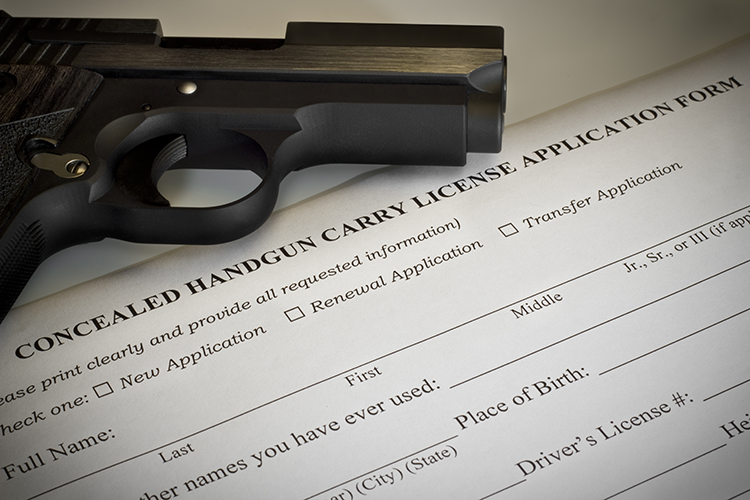New York can't ban concealed carry by default on private property open to public, 2nd Circuit says

A federal appeals court has ruled that many restrictions in New York’s revised concealed-carry law are likely constitutional, including a requirement that applicants be of good moral character. Image from Shutterstock.
A federal appeals court has ruled that many restrictions in New York’s revised concealed-carry law are likely constitutional, including a requirement that applicants be of good moral character.
But the appeals court enjoined a provision that essentially created a default presumption that it is unlawful to carry a gun onto private property open to the general public.
The 2nd U.S. Circuit Court of Appeals at New York ruled in four consolidated cases Dec. 8.
New York adopted the Concealed Carry Improvement Act after the U.S. Supreme Court struck down New York’s requirement that “proper cause” must be shown to obtain a concealed-carry gun license. The Supreme Court’s June 2022 decision, New York State Rifle & Pistol Association Inc. v. Bruen, said gun regulations must be “consistent with the nation’s historical tradition of firearm regulation.”
New York’s new law replaced the “proper cause” standard with a requirement for good moral character for concealed-carry permit holders. The 2nd Circuit said the new requirement was likely constitutional on its face.
The law’s definition of character “is a proxy for dangerousness,” and preventing dangerous individuals from wielding lethal weapons is part of the nation’s tradition of firearm regulation, the appeals court said.
“We recognize that ‘good moral character’ is a spongy concept susceptible to abuse, but such abuses, should they become manifest, can still be vindicated in court as they arise,” the appeals court said.
Also likely constitutional, the 2nd Circuit said, are the law’s bans on carrying guns at sensitive locations that include behavioral and drug treatment centers, public parks, zoos, bars and theaters.
In support of bans on guns at those sensitive locations, the appeals court cited the nation’s tradition of firearms regulation in which vulnerable populations are present, in crowded areas and in locations frequented by children. The appeals court also cited the nation’s history of addressing dangers posed by intoxicated people.
The appeals court also said the law’s catch-all provision—which says applicants must submit other information or forms that are reasonably necessary, as required by the hearing officer—is not unconstitutional on its face. Nor is a requirement that applicants provide current contact information for their spouse, domestic partner or adult cohabitants, the 2nd Circuit said.
Listing cohabitants not only helps the licensing officer learn of potential character references, it also can help the officer learn whether the applicant is dangerous, the appeals court said.
But the appeals court was troubled by other aspects of the law. It upheld injunctions preventing enforcement of provisions that:
• Ban guns on privately owned property open to the public when there is no express indication of consent. The provision essentially creates a default presumption that carrying a gun onto the property is unlawful, unless a sign allows it or consent is expressly given, the appeals court said. Because more than 91% of the property in New York is privately owned, the provision “would turn much of the state of New York into a default no-carriage zone,” and that is inconsistent with the right to carry firearms in self-defense outside the home, the 2nd Circuit said.
• Require disclosure of social media accounts, including handles that are often pseudonyms. “The state points to no historical law conditioning lawful carriage of a firearm on disclosing one’s pseudonyms or, more generally, on informing the government about one’s history of speech,” the appeals court said.
• Ban guns at churches, with an exception for guns carried by security forces, as applied to the church that challenged the law. The church cited its religious beliefs that congregants have a religious duty to protect others. The appeals court said the ban violates the church’s free exercise rights.
The decision allows a majority of New York’s concealed-carry restrictions to remain in effect during litigation, according to a Dec. 8 press release by the New York attorney general’s office. The law took effect in September 2022.
Publications covering the decision include the New York Times, Reuters and Courthouse News Service. How Appealing linked to coverage and the opinion.
Courthouse News Service also covered a second Dec. 8 opinion by the same appeals court that rejected arguments by firearms and ammunition dealers who challenged New York’s licensing requirements for semi-automatic rifles.



